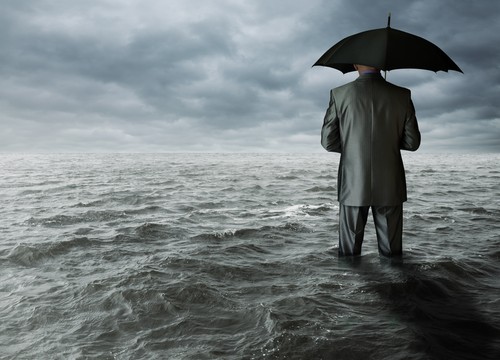Deutsche Bank, ECB and Confidence in Crisis
“Letting Deutsche Bank go under should never be an option, markets are starting to price it in. For a bank that relies on confidence (as all do) that is terrible news,” said Louise Cooper, the founder at Semaphore Macro Limited.
At the moment, the global financial system has a confidence crisis as much as it has an actual one. Will the ECB and German government allow Deutsche Bank to go under? Doubtful. Here’s how we got to this point and what to watch for going forward:
As the top german bank, and arguably one of the most influential in Europe, Deutsche Bank has been at the forefront of U.S Department of Justice crosshairs after being pressured to pay up on $14 billion in settlement fines following claims that they fraudulently managed the selling of mortgage securities in September.
This comes in the face of massive questions of solvency for Deutsche Bank. Since 2008, up until now, news coming out of the bank (and for the system as a whole) have been “relatively” uneventful. So why is it now being questioned as a bank of vital need?
According to an analysis report on banking in Germany from the IMF, “The relative importance of Deutsche Bank underscores the importance of risk management, intense supervision of [globally systemically important banks] and the close monitoring of their cross-border exposures…”
Translation: Deutsche Bank is really well connected, and if it is under pressure – the whole world should pay attention.
In that same report the IMF stated that among the most important banks, “Deutsche Bank appears to be the most important net contributor to systemic risks, followed by HSBC and Credit Suisse.”
Further translation: Deutsche Bank is an institution that is too big to fail, and it is at risk.
So it should not be any surprise that this story is unravelling in such a perilous way. According to some German politicians, it is though.
In a recent interview the German parliament’s economics committee chairman Peter Ramsauer noted that the disputed between the U.S Department of Justice and Deutsche Bank “has the characteristics of an economic war.”
While trade and competition amongst government and nationally important organizations is nothing new, this is a crisis of political posturing as much as it is one of financial chess.
Central Banks on Deutsche Bank
Then there were the central bankers. If trade war allegations and muddling over too-big-to-fail were not compelling enough, central banking policy has certainly not helped.
The current President of the European Central Bank (and former Goldman Sachs banker) Mario Draghi went to the mountain top to preach. Mr. Draghi proclaimed to anyone that would listen that the ECB’s low interest rate plan was not causing the problems that Deutsche Bank has found itself in.
German bankers call foul.
Almost immediately after Draghi’s statement, the head of one of the largest banking organizations in Germany was stern in pointing out that he believed the ECB has been a catalyst for Deutsche Bank’s problems.
Michael Kemmer, the head of Germany’s BdB banking association, said in a radio interview that the ECB’s low interest rate policy was partly responsible for the current problems that Deutsche Bank is finding itself with.
European Central Bank President Mario Draghi said last week that the bank’s low interest rate policies were not responsible for the problems that Deutsche Bank is facing.
“No I don’t share this view,” Draghi told reporters when asked about Kemmer’s remarks on Deutsche Bank and whether the bank posed a systemic risk.
“If a bank represents a systemic threat for the euro zone, this cannot be because of low interest rates – it has to do with other reasons.”
Now the German government, ECB and the IMF are left at a crossroads. If recent history was to be any indicator, this is where elite connections meet government action. While confidence may rattle markets, the elite of the elite will meet in the background to calibrate the winners and losers.
The top central bankers in the world, and ultimately the bankers who decide on monetary policy, are connected to the world’s largest private bank institutions. Those central bankers are then connected to the political leadership. This is important because Christine Lagarde, the head of the IMF, is from the private banking realm and now runs the central bank for the central banks.
This is also important because it gives a very clear map of expectations. It also allows you to see through the noise and understand that the possibility of Deutsche Bank failing is a very unlikely option. The elite connections, perceived importance and political careerism would never condone such actions.
There are stormy days ahead and certainly areas to pay close attention to.
According to best selling author and economic expert, Jim Rickards, “just because Deutsche Bank is “too-big-to-fail” does not mean it’s too big to cause investor losses.” To see that, is to understand that while Deutsche Bank might not be allowed to go under, there will be winners and losers through the turmoil.
Stay tuned as this story continues to play out. On the horizon this week, Friday and Saturday the ECB’s Mr. Draghi will be meeting at the IMF/World Bank Annual Meetings in Washington, D.C. Statements, signals and triggers from the meeting will give further evidence to what bail-out, bail-in and loses might be expected.
Regards,
Craig Wilson, @craig_wilson7
for the Daily Reckoning
Ed. Note: Sign up for a FREE subscription to The Daily Reckoning, and you’ll receive regular insights for specific profit opportunities. By taking advantage now, you’re ensuring that you’ll be set up for updates and issues in the future. It’s FREE.



Comments: